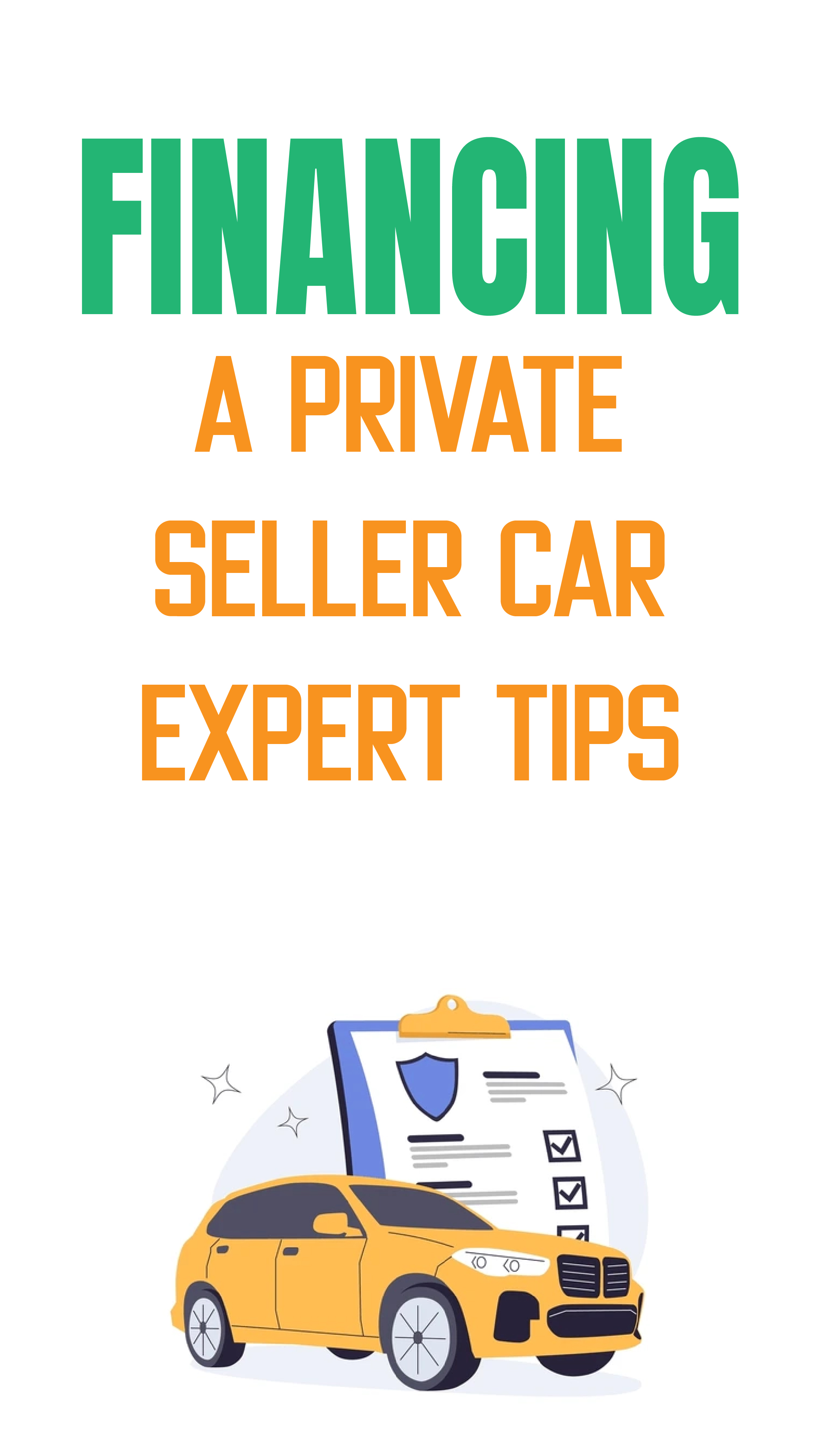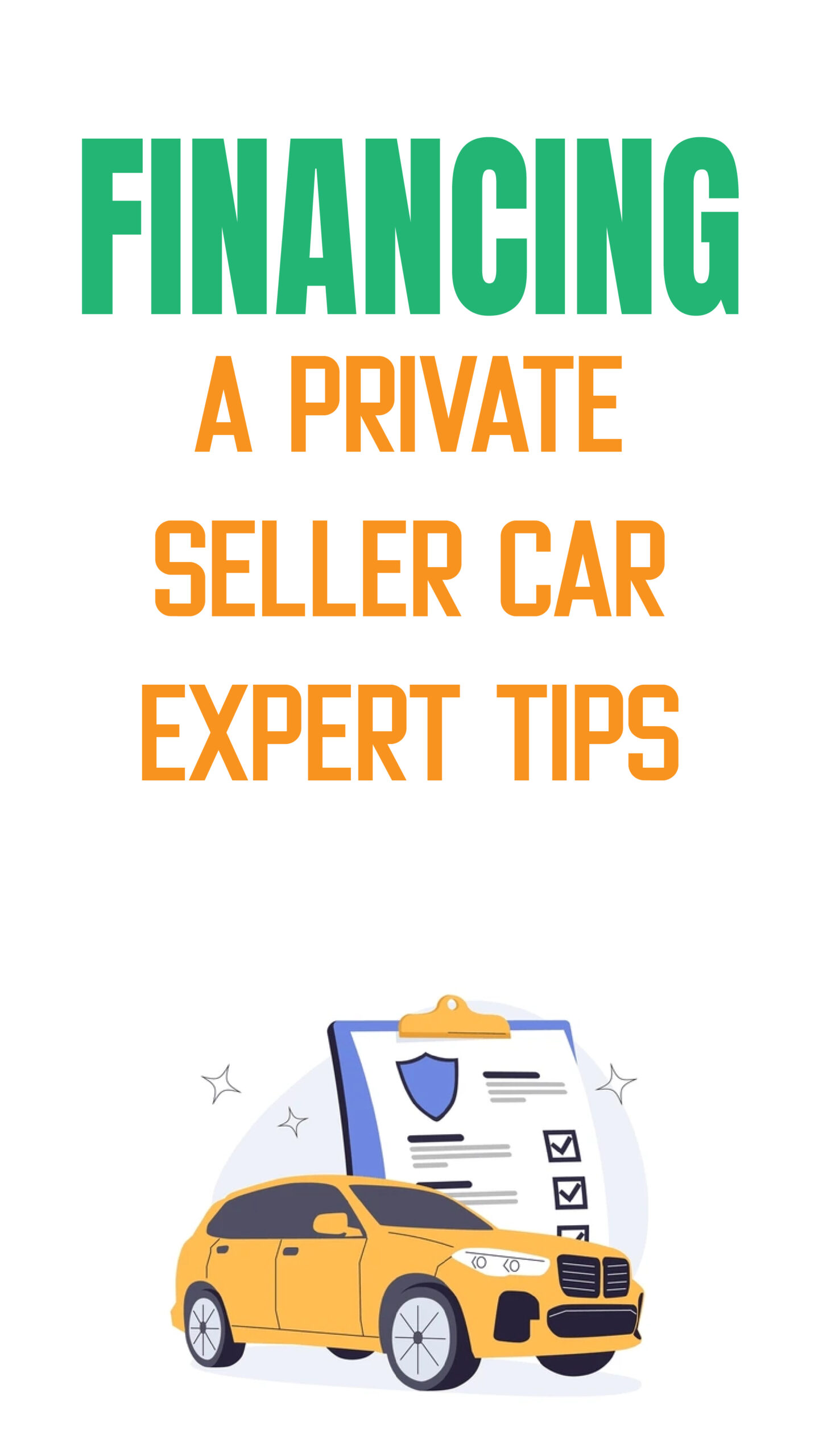To finance a car from a private seller, consider applying for a personal loan or using a credit union. Ensure you research interest rates and terms.
Purchasing a car from a private seller can be a great way to find a unique vehicle at a competitive price. Financing such a purchase, however, can be different from buying through a dealership. Options include personal loans, which can be obtained from banks or online lenders, and credit union loans, which often offer favorable rates.
It’s crucial to compare interest rates, loan terms, and conditions to find the best deal. Proper financing ensures you can secure the vehicle you want while managing your budget effectively.

Credit: hawthorneautosquare.com
Introduction To Private Seller Car Financing
Buying a car from a private seller can be a great way to save money. These deals are often less expensive than dealership prices. But, financing a car from a private seller can feel tricky. This guide will help you understand how to finance a private seller car.
Why Choose Private Sellers?
There are many reasons to choose a private seller for your next car purchase:
- Lower Prices: Private sellers usually offer better prices than dealerships.
- No Sales Pressure: You can take your time to make a decision.
- Unique Options: Find rare or unique car models not available at dealerships.
- Room for Negotiation: Private sellers are often more willing to negotiate.
Common Financing Challenges
Financing a car from a private seller comes with its own set of challenges:
| Challenge | Description |
|---|---|
| Limited Lender Options | Not all lenders finance private seller purchases. |
| Higher Interest Rates | Interest rates can be higher for private seller loans. |
| Loan Approval | Approval may require extra documentation. |
| Vehicle Condition | Private sellers may not provide detailed vehicle history. |
Understanding these challenges can help you prepare better. With the right planning, you can successfully finance a car from a private seller.
Preparing For The Purchase
Preparing for the purchase of a private seller car is crucial. It ensures that you make an informed decision. This involves several key steps to get ready.
Setting A Budget
Setting a budget is the first step. Determine how much you can afford. Include all related costs, not just the car price. Consider taxes, registration, and insurance. Make sure to leave room for unexpected expenses. This way, you won’t overspend.
Checking Credit Scores
Checking credit scores is essential. Your credit score affects loan options. A higher score can get you better rates. You can check your credit score online. Fix any errors you find. Improving your score before applying can save money.
| Step | Description |
|---|---|
| 1. Set a Budget | Determine your maximum spend, including extra costs. |
| 2. Check Credit Scores | Review and improve your score for better loan options. |
- Determine your total budget
- Include taxes and insurance in your budget
- Check your credit score online
- Fix any errors in your credit report
Exploring Financing Options
Buying a car from a private seller can be exciting. But financing it might seem tricky. Let’s explore some financing options to make it easier.
Bank Loans
Many banks offer loans for buying cars from private sellers. It’s a good idea to check with your bank first. Here are some key points:
- Interest Rates: Banks often have competitive interest rates.
- Loan Terms: Loan terms can vary from 36 to 72 months.
- Approval Process: The approval process might take a few days.
You will need to provide documents like:
- Proof of income
- Credit score report
- Vehicle details
Credit Unions
Credit unions are another great option for financing a car. They often provide lower interest rates compared to banks. Here’s what you should know:
- Membership: You need to be a member to get a loan.
- Interest Rates: Usually lower than banks.
- Loan Terms: Flexible terms available.
Credit unions may require:
- Membership application
- Proof of income
- Vehicle information
Exploring these financing options can help you find the best deal. Choose what fits your needs the best.

Credit: www.autocreditexpress.com
Online Lending Platforms
Online lending platforms make it easy to finance a car from a private seller. These platforms connect you with lenders who offer loans specifically for private car purchases. You can get pre-approved, compare rates, and complete most of the process online.
Popular Platforms
Several online lending platforms stand out for their ease of use and reliability.
- LightStream: Known for quick approvals and competitive rates.
- Carvana: Offers financing options directly on their platform.
- Autopay: Lets you compare multiple loan offers from various lenders.
- MyAutoLoan: Provides fast funding and a variety of loan options.
Pros And Cons
| Pros | Cons |
|---|---|
|
|
Using an online lending platform can streamline the financing process. Always compare rates and terms before choosing a lender.
Personal Loans
Financing a car from a private seller can be tricky. One option is personal loans. These loans help you get the car you want without dealership financing. Let’s dive into the details of personal loans.
Secured Vs Unsecured
Personal loans come in two types: secured and unsecured.
| Secured Loans | Unsecured Loans |
|---|---|
| Backed by collateral | No collateral needed |
| Lower interest rates | Higher interest rates |
| Risk of losing the asset | No risk of asset loss |
| Higher loan amounts | Lower loan amounts |
Secured loans use an asset like a house or savings account as collateral. Unsecured loans don’t need collateral but have higher interest rates.
Application Process
The application process for personal loans is straightforward. Follow these steps:
- Check your credit score.
- Compare different lenders.
- Gather necessary documents.
- Fill out the application form.
- Submit the application.
Documents usually needed include:
- Proof of identity
- Proof of income
- Bank statements
- Employment details
After submission, lenders review your application. They might ask for more info. Once approved, funds are transferred to your account. Then, you can pay the private seller.

Using Home Equity Loans
Financing a car from a private seller can be tricky. One option is to use a Home Equity Loan. This loan uses your home’s value to get cash. It can be a good way to get the money you need for a car.
Benefits
Using a home equity loan has many benefits. Here are some of them:
- Lower Interest Rates: Home equity loans often have lower rates than car loans.
- Tax Deductions: You might be able to deduct the interest on your taxes.
- Large Loan Amounts: You can borrow a large amount if your home has enough equity.
- Fixed Payments: The payments are usually fixed, making budgeting easier.
Risks
There are risks to using a home equity loan:
- Loss of Home: If you can’t pay back the loan, you could lose your home.
- Long Repayment Terms: You might be paying off this loan for many years.
- Market Fluctuations: Your home’s value could drop, leaving you with less equity.
- High Closing Costs: These loans often have high fees and closing costs.
By understanding the benefits and risks, you can decide if a home equity loan is right for you.
Dealer Financing Alternatives
Financing a car from a private seller can be tricky. Dealer financing alternatives offer various options to make it easier. This section explores two main types: Dealer Loan Programs and Third-Party Financing.
Dealer Loan Programs
Dealer loan programs are often tied to specific dealers. These programs can offer flexible terms and conditions.
Some benefits of dealer loan programs include:
- Lower interest rates
- Special promotions
- Customized payment plans
Dealers usually have partnerships with banks and credit unions. This can provide better deals than traditional loans.
Tip: Always check multiple dealers to compare their loan programs. This helps you find the best deal.
Third-party Financing
Third-party financing is another option. This involves getting a loan from a bank, credit union, or online lender.
Here are some advantages of third-party financing:
- More flexible terms
- Potentially lower fees
- Pre-approval options
Applying for third-party financing can be quick. Many lenders offer online applications and instant decisions.
Third-party lenders often provide competitive interest rates. This can make your loan more affordable.
Tip: Check your credit score before applying. A higher score can help you get better terms.
| Feature | Dealer Loan Programs | Third-Party Financing |
|---|---|---|
| Interest Rates | Lower with promotions | Competitive |
| Application Process | Through dealer | Direct with lender |
| Approval Time | Varies | Often instant |
Choosing the right financing option is crucial. It affects your monthly payments and overall cost.
Negotiating The Deal
Negotiating the deal is a crucial step in financing a car from a private seller. This process involves discussing the price, terms of payment, and finalizing the agreement. It’s essential to be well-prepared to get the best deal possible.
Price Negotiation Tips
Start by researching the car’s market value. Use online tools like Kelley Blue Book. This gives you a fair price range.
Here are some price negotiation tips:
- Inspect the car: Check for any damages or issues.
- Test drive: Ensure the car runs smoothly.
- Point out flaws: Use them as bargaining chips.
- Set your budget: Know your maximum spending limit.
- Stay calm: Don’t show too much excitement or urgency.
Finalizing The Agreement
Once you agree on a price, it’s time to finalize the deal. Ensure all terms are clear and documented.
Here is a checklist to help:
- Written agreement: Get the terms in writing.
- Payment method: Decide on cash, check, or bank transfer.
- Transfer title: Ensure the car title is properly signed over.
- Bill of Sale: Create a bill of sale for both parties to sign.
- Insurance: Arrange for car insurance before driving off.
Use this table to keep track of the final steps:
| Step | Action |
|---|---|
| 1 | Get the terms in writing |
| 2 | Decide on payment method |
| 3 | Transfer the car title |
| 4 | Create and sign bill of sale |
| 5 | Arrange car insurance |
Following these steps ensures a smooth transaction. Both parties will benefit from a clear and fair agreement.
Final Steps
You’ve found the perfect car and negotiated a deal. Now, it’s time to complete the final steps. This ensures a smooth and secure transaction. Follow these steps to ensure everything is in order.
Paperwork Checklist
Completing the paperwork is crucial. It guarantees legal ownership and protection. Here’s a checklist to help you:
- Bill of Sale: A document showing the sale details.
- Title Transfer: Ensure the title is signed and notarized.
- Odometer Disclosure: Certifies the car’s mileage.
- Release of Liability: Protects you from future claims.
- Proof of Insurance: Required before driving your new car.
Make sure all forms are filled correctly. Double-check for any errors or missing signatures.
Vehicle Inspection
A thorough inspection is vital. It ensures the car is in good condition. Follow this guide for a detailed check:
- Exterior: Look for dents, scratches, and rust.
- Interior: Check seats, dashboard, and electronics.
- Under the Hood: Inspect the engine, battery, and fluids.
- Test Drive: Drive the car to feel its performance.
- Professional Inspection: Consider hiring a mechanic.
Inspecting the vehicle ensures you buy a reliable car. It can also reveal hidden issues.
| Inspection Area | What to Check |
|---|---|
| Exterior | Dents, scratches, rust |
| Interior | Seats, dashboard, electronics |
| Under the Hood | Engine, battery, fluids |
| Test Drive | Performance, handling, brakes |
Following this guide will help ensure a successful purchase. Remember, taking the extra steps now will save you from future headaches.
Expert Advice
Financing a car from a private seller can be challenging. Seeking expert advice can help make the process smoother. Here, we provide insights to help you finance your next car purchase.
Common Mistakes To Avoid
Many buyers make common mistakes when financing a car. Avoid these pitfalls to ensure a successful transaction:
- Skipping a Vehicle History Report: Always check the car’s history.
- Ignoring Pre-Approval: Get pre-approved for a loan before shopping.
- Not Comparing Rates: Compare rates from multiple lenders.
- Overlooking Total Costs: Consider taxes, fees, and insurance.
Additional Resources
To help you further, we’ve compiled a list of additional resources:
| Resource | Description |
|---|---|
| Carfax | Provides detailed vehicle history reports. |
| Bankrate | Compare auto loan rates from multiple lenders. |
| Edmunds | Offers car reviews and pricing information. |
| Kelley Blue Book | Provides car value estimates and financing advice. |

Credit: www.pnc.com
Frequently Asked Questions
How To Buy A Used Car In Texas From A Private Seller?
Research the car’s history and market value. Inspect the vehicle thoroughly. Negotiate the price. Complete a bill of sale. Transfer the title at the DMV.
Can I Use A Personal Loan To Buy A Car?
Yes, you can use a personal loan to buy a car. Personal loans offer flexibility and competitive interest rates.
What Is Chase’s Current Auto Loan Rate?
Chase’s current auto loan rates vary. They typically range from 4. 84% to 13. 97% APR. Rates depend on creditworthiness.
How Can I Finance A Car From A Private Seller?
You can finance a car from a private seller through a bank or credit union. Obtain a pre-approved loan before negotiating. Ensure the car’s title is clean.
Conclusion
Navigating the process of financing a car from a private seller can be straightforward. Follow these steps to secure the best deal. Remember to research thoroughly, gather necessary documents, and explore different financing options. By being prepared and informed, you can confidently purchase your next vehicle from a private seller.

